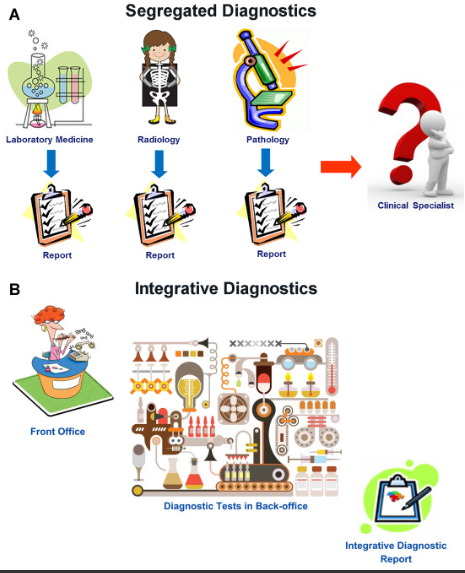Several times I've referred to the cutting-edge policy articles in J Amer Coll Radiol as being worthwhile even for those who work in the other diagnostics field - lab medicine. (See my large article from 2022 here and a short follow up here).
A great example is a new article at JACR by Beauchamp et al. that lays our a roadmap for "Integerative Diagnostics" meaning bringing together imaging with lab medicine & pathology. Find the article open access here:
https://www.jacr.org/article/S1546-1440(22)00902-4/fulltext
The authorship is attributed to the "International Society for Strategic Studies in Radiology." This article also include's an editor's Visual Abstract, a trick I've seen used recently in several journals. The visual abstract is here:
While laying out a roadmap and a range of different value arguments, the authors conclude:
Integrative diagnostics has the potential to identify correct therapies more quickly, modify treatment when appropriate, and terminate treatment when not effective, ultimately decreasing morbidity, improving outcomes, and avoiding unnecessary costs. Radiology, laboratory medicine, and pathology already play major roles in medical diagnostics. Our specialties can increase the value of our examinations by taking a holistic approach to their selection, interpretation, and application to the patient’s care pathway. We have the means and rationale to incorporate integrative diagnostics into our specialties and guide its implementation in clinical practice.
See the authors' own visual comparison of the status quo - different reports from different departments of the hospital - and their vision for the future, where all those divisions become a "back office" (their term) to a comprehenive diagnostic analysis and conclusion.
Since the article is open-access, have-at-it if it sounds worthwhile to you. If you'd like one last perspective, here's a GPT4 AI summary of the article's dicussion section.
- [GPT4] Medical diagnostics play a crucial role in healthcare decision-making and spending. Integrative diagnostics (ID) has the potential to improve cost-effectiveness, streamline care pathways, and address disparities in healthcare access, particularly for minority and underserved populations.
- However, barriers to ID implementation include local reimbursement systems, lack of financial support for informatics infrastructure, and cultural resistance within healthcare organizations.
- ID can also enhance clinical trials and medical education by fostering interdisciplinary collaboration and efficient use of resources.
- Initial efforts at implementing ID in academic medical centers have faced challenges due to IT infrastructure limitations, but progress is being made.
- Recommendations for promoting ID include expanding multidisciplinary teams, integrating medical education across disciplines, enhancing IT infrastructure, and developing financial models that demonstrate ID's value.
- Ultimately, clear vision and effective leadership are needed to catalyze change in the healthcare system to fully adopt ID.


